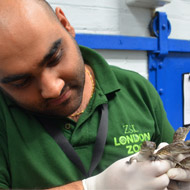
Zookeepers capture the incredible process on camera
ZSL London Zoo has welcomed the first ever Philippine crocodiles to be bred in a UK Zoo.
Weighing in at just 37 grams, the first of the young crocodiles emerged from its egg on June 16, followed by its five siblings over a 48-hour period.
One of the world's rarest reptiles and native only to the Philippines, the baby crocodiles have been named after the islands that they inhabit; Jolo, Mindoro, Samar, Sulo, and Mindanao.
Classified as Critically Endangered due to habitat loss and being hunted for their skins, the six hatchlings are a huge cause for celebration at ZSL London Zoo and the UK, helping to boost the numbers of this rapidly-declining species. Deputy head of the reptile house, Iri Gill, said: "We couldn't be more thrilled".
The parent crocodiles play a hugely significant role in the European Breeding programme for the species. The parents were born at a conservation centre in the Phillipines and were matched as the founding animals for the programme which ensures that the most genetically-diverse animals are placed together.
Iri Gill said: “Currently measuring just 24cms in length and looking like perfect miniature models of their parents, the yet to be sexed hatchlings will eventually grow up to three metres in length.
“Not only are these crocodiles the first of their kind to ever be bred in a UK zoo, but they are also a fantastic addition to the European breeding programme – and we can now use our experience to help other zoos breed these Critically Endangered animals.”
Image courtesy of ZSL London Zoo



 RCVS Knowledge has welcomed Professor Peter Cockcroft as editor-in-chief for Veterinary Evidence.
RCVS Knowledge has welcomed Professor Peter Cockcroft as editor-in-chief for Veterinary Evidence.